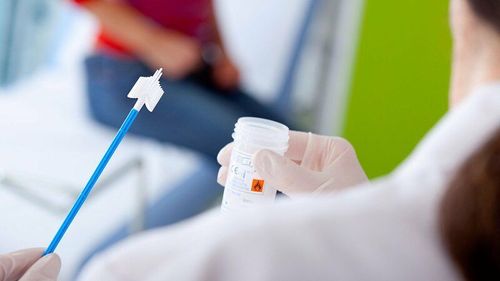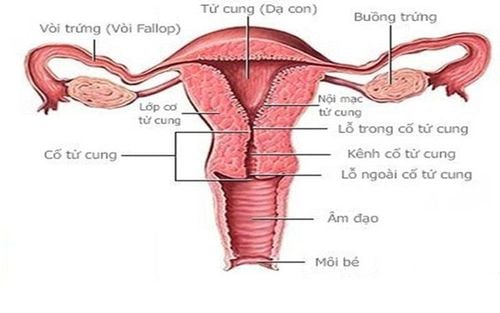This is an automatically translated article.
The Pap Smear test is often recommended for women over the age of 21 to screen for cervical cancer early. It is a highly reliable and accurate test that reduces the risk of cervical cancer in women by up to 80%.
1. What is the Pap Smears test?
Pap Smears is a cervical smear test that looks for precancerous cells on the cervix in women. The introduction of the Pap test is a major breakthrough in medicine, giving women the opportunity to be diagnosed and prevent cancer from developing early.
Usually, a Pap Smears test is done by taking a sample of cells from a woman's cervix. It is then examined under a microscope in a laboratory to look for abnormalities in the cells. The procedure is relatively quick, although the patient may feel some discomfort, but the cases of post-test pain are very rare.
2. Who should have a Pap Smears test?
According to recommendations from leading medical experts in the world, women aged 21 and over should regularly get a Pap test every 3 years. In addition, some of the following situations also require a Pap test, including:
People who test positive for HIV People with weakened immune systems due to organ transplants or who have undergone chemotherapy for another cancer condition Women over the age of 30 should have a Pap test at the same time as an HPV (human papillomavirus) test to screen for cervical cancer. The frequency of testing is about every 5 years. People infected with HPV, especially HPV 16 and 18, the two main strains that cause cervical cancer in women, also need to be tested. Pap smear test.

Những người có xét nghiệm dương tính với HIV cần được thực hiện xét nghiệm Pap
3. Do I need a Pap Smears test if I have had a hysterectomy?
This depends on many different factors and health status of each person.
If you had part of your uterus removed, but your cervix is still there (the lower part of your uterus), your doctor may still ask you to continue with the Pap test.
In case you have been diagnosed as precancerous or cancerous, and have had a complete hysterectomy, meaning that both the uterus and cervix have been removed, regular Pap testing may still be recommended. as a means of early detection of precancerous changes.
Also, if a pregnant woman is taking Diethylstilbestrol (DES), Pap tests should also be done regularly, because exposure to DES significantly increases the risk of developing cervical cancer. bow.
However, you can stop having Pap smear testing if you've had a total hysterectomy for a noncancerous condition. In addition, women after the age of 65, whether or not they have had a hysterectomy, as long as they have consecutively normal Pap screening results and are not at high risk for cervical cancer, are completely safe. may stop routine Pap screening.

Xét nghiệm Pap Smears nếu đã cắt bỏ tử cung cần phụ thuộc vào tình trạng sức khỏe của mỗi người
4. A few things to keep in mind before having a Pap Smears test
Pap test results will be more accurate if done in the middle of a woman's menstrual cycle. Therefore, when the "red light" day comes, you should not conduct this test. If you have scheduled your test in advance, you and your doctor can swap it out for a different time so that the results are more accurate and reliable.
In addition, before the day of Pap smear, you should avoid deep douching, sexual intercourse or use some spermicides so as not to affect the test results.
In certain cases, the Pap test can be uncomfortable and painful, so you should stay calm, relax, and breathe deeply during the procedure. This will make the test go faster and more smoothly.
5. What the Pap Smears Test Results Mean
Usually, patients will receive the results of the Pap smear test in just 1 day. Here's what the Pap Smears test results mean, including:
5.1 Normal results
That means no abnormal cells were found and you won't need a Pap test for the next 3 years.

Nếu kết quả xét nghiệm Pap Smears bình thường thì bạn sẽ không cần phải thực hiện xét nghiệm Pap trong vòng 3 năm tới.
5.2 Abnormal results
Indicates the presence of cancer. These cells may be precancerous cells. The main grades of abnormal cells in the cervix, include: atypical, mild, moderate, severe dysplasia, and finally ectocarcinoma. From the results of the Pap test, the doctor may order a colposcopy, or other Pap smear test.
In general, the Pap test is often highly accurate, so regular screening reduces the risk of cervical cancer by up to 80% in women.
Any questions that need to be answered by a specialist doctor as well as customers wishing to examine and perform a Pap test at Vinmec International General Hospital, you can contact Vinmec Health System nationwide. or register online HERE.
References: webmd.com, mayoclinic.org
SEE MORE
Pap test and cervical cancer Signs of cervical cancer women should not ignore How often should a Pap smear to screen for cervical cancer?













